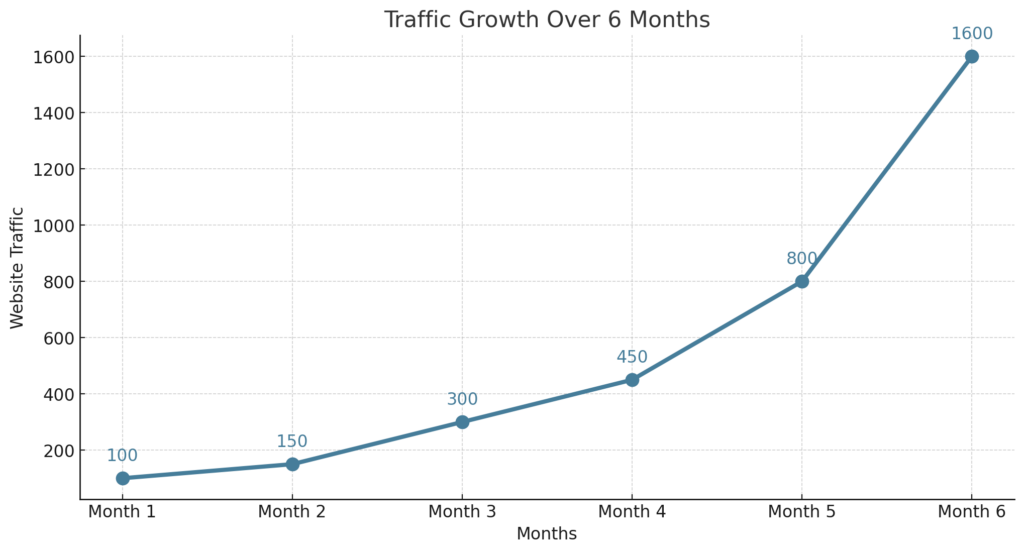
In today’s digital world, if your small business isn’t optimised for search engines, you’re basically invisible. But let’s be honest—traditional keyword research can feel like a headache, especially if you’re not a tech wizard. This is where artificial intelligence (AI) steps in. Using AI for keyword research makes the process faster, smarter, and easier. In this guide, we’ll show you how to harness AI tools to nail your SEO strategy and get your content seen by the right people.
Whether you’re a small business looking to expand your reach or just want to boost your website’s visibility, this guide will walk you through the process step-by-step. By the end, you’ll know exactly how to use AI tools to find the best keywords for your content, create SEO-optimised articles, and set yourself up for long-term success.
Why SEO Matters for Your Business
SEO, or Search Engine Optimisation, is all about making your content more visible on search engines like Google. When you optimise your website, it’s more likely to appear on the first page of search results when people search for relevant terms. This means more people will find your business, boosting your traffic, leads, and sales.
Benefits of SEO-Optimising Your Content:
- Increase in Website Traffic: Better SEO means higher rankings, and higher rankings mean more visitors to your site.
- Boost in Credibility: Websites that rank on the first page are often seen as more credible and trustworthy.
- Better Customer Engagement: Well-optimised content tends to be more relevant, helping you engage better with your audience.
- Long-Term Success: Unlike paid ads, SEO results are long-lasting and can keep generating traffic for months or even years.
SEO Goals and Results: What to Expect
Imagine you’re running a small business and decide to post two pieces of SEO-optimised content every week. After about six months, you’d have roughly 48 pieces of well-crafted content, each designed to attract a specific audience. With the right keywords and consistency, here’s what your results could look like:
- Month 1-2: Minimal impact. Google’s still figuring out where to place your content.
- Month 3-4: You start seeing a steady increase in organic traffic, especially if your content is helpful and engaging.
- Month 5-6: Expect significant growth in rankings and traffic, potentially leading to a 3-5x increase in monthly visitors.
Visualising Your SEO Growth
Here’s a quick graph to show what your traffic might look like over the first six months:

Approaches to Keyword Research

Before diving into AI tools, let’s quickly look at the traditional methods of keyword research:
- Manual Research: Using tools like Google Keyword Planner or exploring competitors’ sites to identify high-ranking keywords.
- Analysing Competitors: Checking what keywords competitors are ranking for and using them as inspiration.
- Using SEO Platforms: Platforms like Ahrefs or SEMrush allow you to see keyword difficulty, search volume, and related terms.
The Challenges of Traditional Keyword Research
- It’s time-consuming.
- You might end up missing valuable keywords.
- Analysing all the data manually can be overwhelming.
How AI Changes the Game
AI tools can analyse vast amounts of data in seconds, spot keyword trends, and even suggest content ideas based on user intent. This saves time and ensures you’re targeting the right keywords with high-ranking potential.
Top AI-Powered Tools for Keyword Research
Now, let’s get into the tools. We’ll cover some of the best AI-driven platforms available today, like Ahrefs, SEMrush, Google Keyword Planner, and even AI models that you can integrate into your workflow.
1. Ahrefs: The All-Rounder
Ahrefs is a powerful SEO tool known for its extensive keyword research capabilities. It uses AI algorithms to provide keyword suggestions, analyse competitors, and track your ranking over time. Here’s how to use it for keyword research:
- Log in and Head to the Keywords Explorer.
- Enter your seed keyword (e.g., “organic skincare products”).
- Ahrefs will provide a list of related keywords, along with their search volume, keyword difficulty, and potential traffic.
- Use the “Questions” filter to see what people are asking related to your topic.
Pro Tip: Use Ahrefs’ Content Gap Tool to find out which keywords your competitors rank for, but you don’t.
2. SEMrush: Your Competitor Analysis Buddy
SEMrush is another industry favourite for keyword research and competitor analysis. Its AI-driven tools help you find keyword ideas and monitor what your competitors are up to.
- Log in to SEMrush.
- Go to Keyword Overview and enter your target keyword.
- SEMrush will show related keywords, their volume, and SEO difficulty.
- Use the Keyword Magic Tool to get a deeper list of keyword suggestions.
Pro Tip: Use SEMrush’s Competitor Analysis Tool to identify which sites are outranking you for your target keywords.
3. Google Keyword Planner: The Classic Choice
If you’re looking for a free option, Google Keyword Planner is your go-to. While not as advanced as Ahrefs or SEMrush, it’s perfect for small businesses starting out.
- Log in to Google Ads and head to the Keyword Planner.
- Click on Discover New Keywords.
- Enter your product or service.
- You’ll get a list of suggested keywords, including average monthly searches and competition level.
Pro Tip: Use the location filter to narrow down your results to your specific target audience.
4. Surfer SEO: AI-Powered Content Suggestions
Surfer SEO isn’t just for keyword research—it’s a content optimisation tool that suggests keywords and topics as you write.
- Enter your primary keyword into the Surfer dashboard.
- Surfer will analyse top-performing content and suggest additional keywords to include.
- Use the Content Editor to optimise your article as you write.
Pro Tip: Follow Surfer’s Content Score to ensure your article is fully optimised before publishing.
5. ChatGPT: Your AI Research Assistant
While ChatGPT might not be a traditional keyword research tool, you can use it creatively to come up with content ideas, identify related keywords, and even write engaging meta descriptions.
- Enter a query like: “What are the top keywords for organic skincare products?”
- ChatGPT can provide keyword suggestions, ideas for headings, and even a basic content outline.
- Use these results to cross-reference with more traditional tools like Ahrefs or SEMrush.
Pro Tip: Use ChatGPT to simulate audience queries to understand what potential customers are searching for.
Using AI to Identify Keyword Opportunities
Now that we’ve covered the tools, let’s dive into a practical example. Suppose you’re running a small organic skincare business and want to attract more traffic. Here’s how you can use AI to find the best keywords:
- Start with a Seed Keyword: Enter “organic skincare” into Ahrefs or SEMrush.
- Filter for Long-Tail Keywords: These are phrases with 3-5 words like “best organic skincare for sensitive skin.”
- Check Search Volume and Difficulty: Focus on keywords with moderate volume and low competition.
- Analyse User Intent: Use ChatGPT to understand what users are looking for when they type in that keyword.
- Generate Content Ideas: Use Surfer SEO to suggest topics and structure for your content.
Creating a Keyword Strategy with AI
Once you’ve identified your keywords, it’s time to create a strategy:
- Group Keywords by Topic: For example, all “organic skincare” keywords could go under a “Skincare” category.
- Create a Content Calendar: Plan your articles, blogs, or social media posts around these keywords.
- Optimise Your Content: Use Surfer SEO’s Content Editor to ensure you’re using your keywords naturally.
- Track and Adjust: Use Ahrefs or SEMrush to track your progress and refine your strategy over time.
Visualising Your Keyword Strategy
[Insert an illustration of a simple keyword strategy plan, breaking down keywords into categories, content ideas, and a posting schedule.]
Final Thoughts: Getting Started with AI for SEO
Using AI for keyword research is like having a digital assistant who does all the heavy lifting for you. Whether you’re using advanced platforms like Ahrefs and SEMrush or getting creative with ChatGPT, AI tools can save time and make your SEO strategy more effective.
With the right approach, you can identify high-potential keywords, optimise your content, and start climbing the ranks in Google’s search results. Remember, SEO is a marathon, not a sprint—but with AI on your side, you’ll be ahead of the pack in no time!
Start experimenting, stay consistent, and watch your traffic grow!